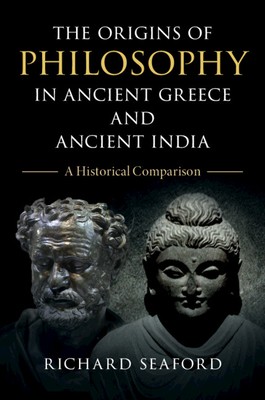
- We will send in 10–14 business days.
- Author: Richard Seaford
- Publisher: Cambridge University Press
- ISBN-10: 1108499554
- ISBN-13: 9781108499552
- Format: 15.8 x 23.4 x 2.5 cm, hardcover
- Language: English
- SAVE -10% with code: EXTRA
The Origins of Philosophy in Ancient Greece and Ancient India (e-book) (used book) | bookbook.eu
Reviews
Description
Why did Greek philosophy begin in the sixth century BCE? Why did Indian philosophy begin at about the same time? Why did the earliest philosophy take the form that it did? Why was this form so similar in Greece and India? And how do we explain the differences between them? These questions can only be answered by locating the philosophical intellect within its entire societal context, ignoring neither ritual nor economy. The cities of Greece and northern India were in this period distinctive also by virtue of being pervasively monetised. The metaphysics of both cultures is marked by the projection (onto the cosmos) and the introjection (into the inner self) of the abstract, all-pervasive, quasi-omnipotent, impersonal substance embodied in money (especially coinage). And in both cultures this development accompanied the interiorisation of the cosmic rite of passage (in India sacrifice, in Greece mystic initiation).
EXTRA 10 % discount with code: EXTRA
The promotion ends in 18d.16:37:12
The discount code is valid when purchasing from 10 €. Discounts do not stack.
- Author: Richard Seaford
- Publisher: Cambridge University Press
- ISBN-10: 1108499554
- ISBN-13: 9781108499552
- Format: 15.8 x 23.4 x 2.5 cm, hardcover
- Language: English English
Why did Greek philosophy begin in the sixth century BCE? Why did Indian philosophy begin at about the same time? Why did the earliest philosophy take the form that it did? Why was this form so similar in Greece and India? And how do we explain the differences between them? These questions can only be answered by locating the philosophical intellect within its entire societal context, ignoring neither ritual nor economy. The cities of Greece and northern India were in this period distinctive also by virtue of being pervasively monetised. The metaphysics of both cultures is marked by the projection (onto the cosmos) and the introjection (into the inner self) of the abstract, all-pervasive, quasi-omnipotent, impersonal substance embodied in money (especially coinage). And in both cultures this development accompanied the interiorisation of the cosmic rite of passage (in India sacrifice, in Greece mystic initiation).


Reviews